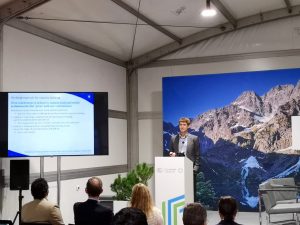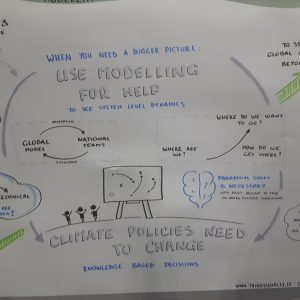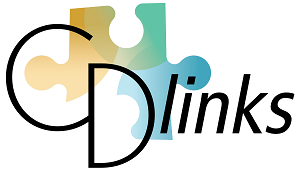CD-LINKS at COP24
The CD-LINKS project organized three side events during the 2018 United Nations’ twenty-fourth Climate Change Conference of the Parties (COP24) in Katowice, Poland. An official UNFCCC side event was co-hosted with the NEDO and Carbon at which the IAMC SR1.5 Scenario Explorer, to the development of which CD-LINKS contributed, was presented. A second side event was hosted under the PCCB capacity building hub which focused on presenting the CD-LINKS capacity building activities, including the research exchange program and the summer school which will be held in June and July 2019 in Venice. The third side event at the EU Pavilion, was jointly organized with the COMMIT project and the German Umweltbundesamt. The side event was showcasing integrated global and national low-carbon transformation pathways and the link to sustainable development objectives.
Background
Climate change is intricately linked to sustainable development both in terms of the underlying drivers and policy choices to achieve the related goals. To effectively inform decision making on ways to achieve climate and sustainable developmental goals concurrently, science needs to take an integrated and holistic perspective. This requires comprehensive analysis of future development pathways that align both global and national perspectives, and address multiple policy priorities simultaneously. The EU Horizon 2020 funded project – Linking Climate and Development Policies – Leveraging International Networks and Knowledge Sharing – (CD-LINKS) explicitly aims to establish a research network and capacity building platform in order to leverage knowledge-exchange among institutions from Europe and key emerging economies and developing countries.
New Scenario Explorer for IPCC SR1.5
The CD-LINKS project contributed to the collection and vetting of the scenario ensemble that was assessed in the IPCC Special Report on Global Warming of 1.5°C (SR1.5). This quantitative, model-based scenario ensemble is accessible through the IAMC 1.5°C Scenario Explorer hosted by IIASA. The scenario ensemble contains more than 400 emissions pathways, which focus on limiting temperature rise to below 1.5°C or 2°C above pre-industrial levels, and provide information on the underlying socio-economic development, energy system transformations and land use change until the end of the century, developed by over a dozen research teams from around the world. The Scenario Explorer, which was developed by IIASA on behalf of the Integrated Assessment Modeling Consortium (IAMC) and IPCC Working Group III, is equipped with a new interactive interface that allows policymakers and researchers in related fields such as climate finance easy access and analysis of the pathways.
This official UNFCCC side event was co-hosted by the New Energy and Industrial Technology Development Organization (NEDO) and Carbon Trust and took place on December 10th.
- ICEF 2018 Roadmap on Direct Air Capture of Carbon dioxide – David Sandalow and Julio Friedmann (Columbia University)
- The New Scenario Explorer for IPCC SR1.5 – Volker Krey (IIASA)
Following the two presentations a panel discussion that included IPCC Vice-chair Youba Sokona and Carbon Trust Chief Executive Tom Delay focused on the question which innovations will be needed to achieve net zero CO2 emissions.
Capacity building activities

As one of the four pillars of the CD-LINKS project, the activities to establish a research network and capacity building platform between research institutions from the EU and non-EU countries play an important role. As such, CD-LINKS was invited to contribute to the newly established Capacity-building Hub that was organized for the first time at COP24 by the Paris Committee on Capacity-building (PCCB). The PCCB is fostering dialogue, coordination, collaboration and coherence among all relevant stakeholders, within and outside of the Convention, with a view to promoting and exploring synergies to boost action.
The capacity building and knowledge sharing activities in the CD-LINKS project include
- developing communication and open-access tools to ensure a diverse set of users are able to exploit project results for their purposes,
- a dedicated exchange program for early- to mid-career scientists within the project, and
- conducting capacity building workshops and a summer school to engage external analysts and researchers.
This side event introduced the CD-LINKS project and its activities, focusing specifically on how national-global interactions and climate-sustainable development linkages are modelled, and the capacity building activities initiated to achieve its objectives.
- Integrated climate change and sustainable development analysis at the national and global scale – an overview of the CD-LINKS project – Volker Krey (IIASA)
- Tools for assessing the impact of climate policies and NDCs – Heleen van Soest (PBL)
- The MESSAGEix modeling framework and other state-of-the-art tools for integrated scenario analysis – Daniel Huppmann (IIASA)
- Experiences with the collaborative capacity building approach – Swapnil Shekhar (TERI)
An interactive discussion with the audience on the need to improve the representation of behavioral change, population heterogeneity and sub-national issues and concerns into climate change related analysis rounded the side event up.
Modelling tools for long-term planning
 Finally, CD-LINKS was hosting a side event at the EU Pavilion on December 13th, in collaboration with the COMMIT project and the German Umweltbundesamt. The side event showcased integrated global/national low-carbon transformation pathways and the link to sustainable development objectives. The modelling underlying the EU’s long term strategy was presented, researchers from major economies shared their experience in different areas of policy implementation and design based on collaborative projects from across the globe.
Finally, CD-LINKS was hosting a side event at the EU Pavilion on December 13th, in collaboration with the COMMIT project and the German Umweltbundesamt. The side event showcased integrated global/national low-carbon transformation pathways and the link to sustainable development objectives. The modelling underlying the EU’s long term strategy was presented, researchers from major economies shared their experience in different areas of policy implementation and design based on collaborative projects from across the globe.
- Introduction – Heleen van Soest (PBL)
- Setting the scene: Long term pathways, global/national, including importance to integrate with sustainable development – Detlef van Vuuren (PBL) & David McCollum (IIASA)
- Example: EU modelling suite, Global Energy and Climate Outlook – Kimon Keramidas (European Commission, JRC)
- Response: Analysis of the latest EU proposal for the long-term climate strategy – Guido Knoche (UBA)
- Lessons learned: Good practices – Michel den Elzen (PBL)
Panel:
- Tom van Ierland (EU, European Commission)
- Alexandre Köberle (Brazil, COPPE)
- Swapnil Shekhar (India, TERI)
- Vaibhav Chaturvedi (India, CEEW)
Audience discussions after the talks focused on the ability of global integrated assessment models to capture fine-scale dynamics, such as electricity transmission and distribution capacity expansions; the role that the social cost of carbon should play in modeling analyses; and the importance of the EU and other developed countries in signaling the ambition for and feasibility of deep decarbonization efforts.
